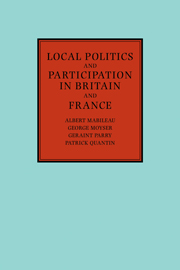Book contents
- Frontmatter
- Contents
- List of figures and tables
- Notes on contributors
- Preface
- PART I SCOPE AND CONTEXT
- PART II PARTICIPATION
- PART III POLITICAL MOBILISATION
- PART IV LOCAL ELITES, GROUPS AND CITIZENS
- PART V COMMUNITY OR LOCALITY?
- Introduction
- 9 Community, locality and political action: two British case studies compared
- 10 In search of community spirit
- Conclusion
- PART VI CONCLUSIONS
- Bibliography
- Index
9 - Community, locality and political action: two British case studies compared
Published online by Cambridge University Press: 04 May 2010
- Frontmatter
- Contents
- List of figures and tables
- Notes on contributors
- Preface
- PART I SCOPE AND CONTEXT
- PART II PARTICIPATION
- PART III POLITICAL MOBILISATION
- PART IV LOCAL ELITES, GROUPS AND CITIZENS
- PART V COMMUNITY OR LOCALITY?
- Introduction
- 9 Community, locality and political action: two British case studies compared
- 10 In search of community spirit
- Conclusion
- PART VI CONCLUSIONS
- Bibliography
- Index
Summary
There is a long-standing theory, of which Tocqueville and John Stuart Mill are joint progenitors, that local government is the school in which political understanding and participation is learned (see Parry 1972: 3–38). Knowledge of local problems and interest in their solution would enhance local participation, with beneficial effects for both individual and society. Despite the longevity of the theory and its popularity, particularly amongst those radical democrats who favour de-centralisation, the empirical evidence in favour of the link between locality and participation is scanty and contradictory (Verba and Nie 1972: 229–32). To some degree this state of affairs arises because of uncertainty about the central terms in the discourse (Rossi 1972) and about the way in which individual participation is mediated by locality.
According to one view, participation will be enhanced to the extent that individuals live in ‘communities’, which are, at a minimum, localities characterised by a certain sense of solidarity and common identity. In such ‘communities’ residents are likely to have ‘an intention … to act in certain ways towards one another, to respond to each other in particular ways, and to value each other as a member of the group’ (Plant 1978: 89). Such intentions are actualised, it is hypothesised, in higher levels of local participation. The major problem with this ‘community identification’ theory arises from the deep ambivalence of the notion of community which is a prime instance of the ‘essentially contestable concept’ (Gallie 1955–6) in that a person's notion of a community is inextricably related to that person's ideological stance on a range of other values.
- Type
- Chapter
- Information
- Local Politics and Participation in Britain and France , pp. 190 - 214Publisher: Cambridge University PressPrint publication year: 1990



